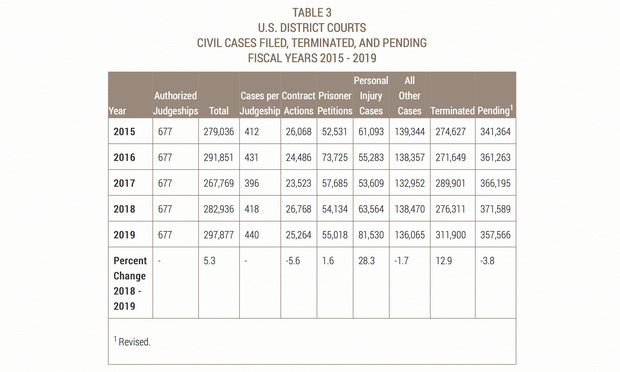Small Law Firms Fight Back as More Personal Injury Cases Move to Federal Court
Charles Baumberger, Rossman, Baumberger, Reboso & Spier.
Prior to the coronavirus devastation that shut down lawsuits across the country, government data showed that personal injury cases filed in federal court had increased dramatically by nearly 30% over the past full calendar year.
This is bad news for small claiming firms that often lack the resources to fight in federal court. However, this could soon change as companies adapt.
According to the latest available report on the judicial business published by the U.S. Courts Administration Bureau in all U.S. district courts nationwide, 81,530 cases were filed in 2019, nearly 18,000 more cases than the previous year and nearly 28,000 more cases than 2017.
Charles Baumberger, partner at Rossman, Baumberger, Reboso & Spier in Miami, points out a reason his most recent maritime law case has landed in a state court.
A client who sustained injuries after falling aboard a cruise ship in Alaska had a forum selection clause that required a lawsuit to be filed in federal court in the southern district of Florida.
“If you’re dealing with admiralty cases down here in the southern district of Florida, passengers have what is called a contracted passage that they have to sign,” Baumberger said. “In this contract you have a one-year statute of limitations during which you must file a lawsuit in federal courts.”
Baumberger also identified the large differences in the workload of regional courts to federal courts. Additionally, the requests in federal courts are more detailed as they must contain a memorandum of law that can incriminate smaller businesses.
Miami attorney Philip D. Parrish said small plaintiff firms often do not have the time or resources to attend to a case pending in federal court, for example, while they are out and about to make deposits and other discoveries. Parrish also noted that a summary judgment is often easier to get in a federal court than in a state court.
“Chains like Walmart and Target, as well as insurance companies, are moving cases to federal court because the defendants are trying to take advantage of what they believe is a friendlier standard for summary judgment in federal courts,” Parrish said. “They also believe that not many personal injury lawyers and plaintiffs can litigate so easily in federal courts.”
 Civil file data in US District Courts.
Civil file data in US District Courts.
Parrish is an example of a plaintiff’s attorney who was able to capitalize on this trend by making the defense attorney choose to try personal injury cases in federal court. Parrish works with plaintiffs’ attorneys during the trial to investigate and provide written assistance to harassed personal injury attorneys who are used to suing in state courts.
The remaining question is whether this trend of personal injury cases filed in federal court will continue its upward trend.
Richard P. Cole, a partner at Cole Scott & Kissane in Miami who works on personal injury prevention issues, implied that this trend could stall in 2020 due to the coronavirus and the associated delay in federal litigation resulting from the pandemic.
However, it is likely that the trend will resume after 2020. According to Baumberger, the cost-effectiveness of negotiating a personal injury case in a federal court has made it more lucrative for defense attorneys given the demands made at that location.
“I know defenders like it,” said Baumberger. “You bill by the hour.”
